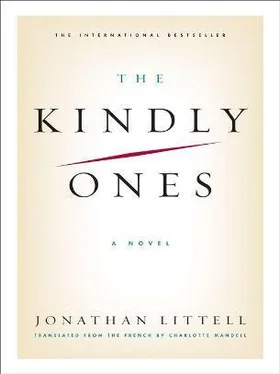At the foot of the Mashuk, I sent Hanning back to the AOK and went by the Academic Gallery to the Pushkin baths, which the Wehrmacht had partially reopened for its convalescents. There I stripped naked and plunged my body into the scalding, brackish, sulfurous water. I stayed in it for a long time and then rinsed myself off in a cold shower. This treatment reinvigorated my body and soul: my skin was mottled red and white, and I felt more awake, almost light. I returned to my quarters and lay down for an hour, my feet crossed on the sofa, facing the open French window. Then I changed and went down to the AOK to find the car I had requested that morning. On the way, I smoked and contemplated the volcanoes and the soft blue mountains of the Caucasus. Night was already setting in; it was fall. Entering Kislovodsk, the road passed the Podkumok; below, peasants’ carts were fording the river; the last one, just a board on wheels, was pulled by a camel with long hair and a thick neck. Hohenegg was waiting for me at the Kasino. “You look fit,” he said when he saw me.—“I’m a new man. But I had a strange day.”—“Tell me all about it.” Two bottles of white wine from the Palatinate were waiting next to the table in ice buckets: “I had those sent to me by my wife.”—“You’re in a class by yourself, Doktor.” He uncorked the first one: the wine was cool and bit the tongue, leaving behind it a fruity caress. “How is your conference going?” I asked him.—“Very well. We’ve gone over cholera, typhus, and dysentery, and now we’re coming to the painful subject of frostbite.”—“It’s not the season for that yet.”—“It will be soon enough. And you?” I told him about the old Bergjude . “A wise man, this Nahum ben Ibrahim,” he commented when I had finished. “We can envy him.”—“You’re probably right.” Our table was placed right against a partition; behind it was a private booth, from which laughter and bursts of indistinct voices were emanating. I drank a little wine. “Still,” I added, “I have to admit that I had trouble understanding him.”—“Not me,” Hohenegg asserted. “You see, in my view there are three possible attitudes faced with this absurd life. First the attitude of the mass, hoi polloi, which simply refuses to see that life is a joke. They don’t laugh at it, but work, accumulate, masticate, defecate, fornicate, reproduce, get old, and die like oxen harnessed to the plow, as idiotic as they lived. That’s the large majority. Then there are those, such as me, who know that life is a joke and who have the courage to laugh at it, like the Taoists or your Jew. Finally there are those, and if my diagnosis is correct you are one of them, who know that life is a joke, but who suffer from it. It’s like your Lermontov, whom I’ve finally read: I zhizn takaya pustaya i glupaya shutka , he writes.” I knew enough Russian now to understand and complete the phrase: “He should have added: i grubaya , ‘an empty, stupid and dirty joke.’”—“He certainly thought of it. But it wouldn’t have scanned right.”—“Those who have that attitude do know, however, that the other laughing one exists,” I said.—“Yes, but they don’t manage to adopt it.” The voices on the other side of the partition had become clearer: a waitress had left the curtain of the booth open as she went out. I recognized the coarse intonations of Turek and his lackey Pfeiffer. “Women like that should be banned from the SS!” Turek was screeching.—“That’s right. He should be in a concentration camp, not a uniform,” Pfeiffer replied.—“Yes,” said another voice, “but you need evidence.”—“We saw them,” said Turek. “The other day, behind the Mashuk. They left the road to go do their things in the woods.”—“Are you sure?”—“I give you my word as an officer.”—“And you recognized him?”—“Aue? He was as close to me as you are now.” The men suddenly fell silent. Turek turned slowly around and saw me standing in the entrance to the booth. His flushed face drained of blood. Pfeiffer, at the head of the table, went yellow. “It is very regrettable that you should use your word as an officer so lightly, Hauptsturmführer,” I said clearly, in a measured, neutral tone. “That devalues it. Yet there is still time to withdraw your despicable words. I warn you: if you don’t, we must fight.” Turek had gotten up, abruptly pushing back his chair. An absurd tic was deforming his lips, giving him an even more spineless and lost look than usual. His eyes sought out Pfeiffer, who encouraged him with a sign of his head. “I have nothing to withdraw,” he squeaked in a monotone. He still hesitated to go all the way. I was filled with a strong exaltation; but my voice remained calm, precise. “Are you quite sure?” I wanted to push him, to inflame him and slam all the doors shut behind him. “I won’t be as easy to kill as an unarmed Jew, you can be sure of that.” These words provoked a commotion. “You’re insulting the SS!” Pfeiffer roared. Turek was pale; he looked at me like a mad bull, without saying anything. “Very well, then,” I said. “I will send someone soon to the Teilkommando offices.” I turned on my heel and left the restaurant. Hohenegg caught up with me on the steps: “That’s not very smart, what you did there. Lermontov has decidedly gone to your head.” I shrugged my shoulders. “Doktor, I believe you are a man of honor. Will you be my second?” Now it was his turn to shrug his shoulders. “If you like. But it’s idiotic.” I patted him amiably on the shoulder. “Don’t worry! Everything will go well. But don’t forget your wine, we’ll need it.” He brought me to his room and we finished the first bottle. I spoke to him a little about my life and my friendship with Voss: “I like him a lot. He’s an astonishing man. But it has nothing to do with what those swine are imagining.” Then I sent him to the Teilkommando offices and began the second bottle as I waited for him, smoking and watching the autumn sun play on the large park and the slopes of the Maloe Sedlo. He returned from his errand after an hour. “I should warn you,” he said point-blank, “they’re plotting something.”—“How’s that?”—“I went into the Kommando and heard them bellowing. I missed the beginning of the conversation, but I heard the fat one say: ‘That way we won’t run any risks. Anyway he doesn’t deserve anything else.’ Then your enemy, the one who looks like a Jew, right? replied: ‘And what about his second?’ The other one shouted: ‘Too bad for him.’ After that I came in and they shut up. In my opinion they’re getting ready to simply massacre us. Talk about the honor of the SS!”—“Don’t worry, Doktor. I’ll take my precautions. Did you settle on the arrangements?”—“Yes. We’ll meet them tomorrow night at six o’clock outside of Zheleznovodsk and we’ll go find an isolated balka . The dead man will be chalked up to the partisans lurking around there.” “Yes, Pustov’s gang. That’s a good idea. Shall we go eat?”
I returned to Pyatigorsk after eating and drinking heartily. Hohenegg, during the dinner, had been glum: I saw that he disapproved of my action and of the whole business. I was still strangely exalted; it was as if a great weight had been taken from my shoulders. I would kill Turek with pleasure; but I had to think about how to foil the trap that he and Pfeiffer wanted to set for me. An hour after I got back, someone knocked on my door. It was an orderly from the Kommando, who handed me a piece of paper. “Sorry to disturb you so late, Hauptsturmführer. It’s an urgent order from the Gruppenstab.” I tore it open: Bierkamp was summoning me at eight o’clock the next day, along with Turek. Someone had given the game away. I dismissed the orderly and collapsed on the sofa. I felt as if I were being pursued by a curse: whatever I tried to do, any pure action would be denied me! I thought I saw the old Jew, in his grave on the Mashuk, laughing at me. Drained, I burst into tears and fell asleep crying, fully dressed.
Читать дальше










